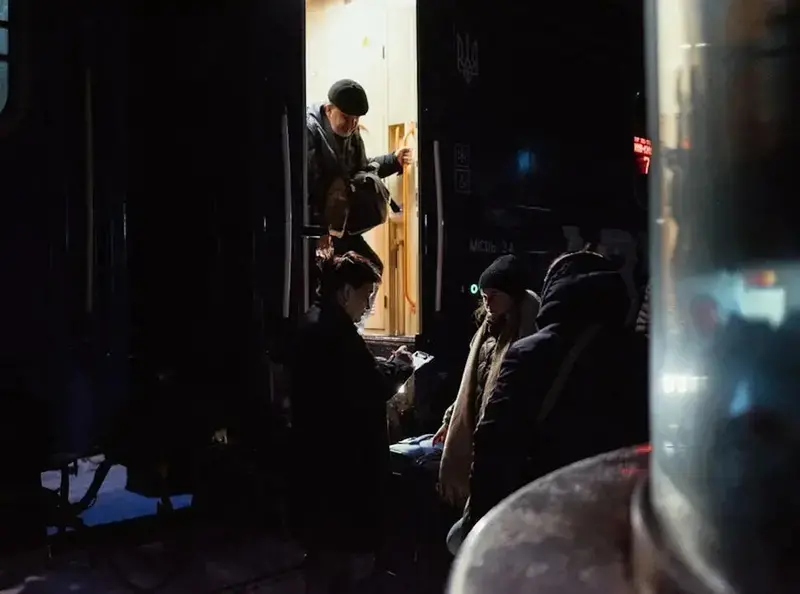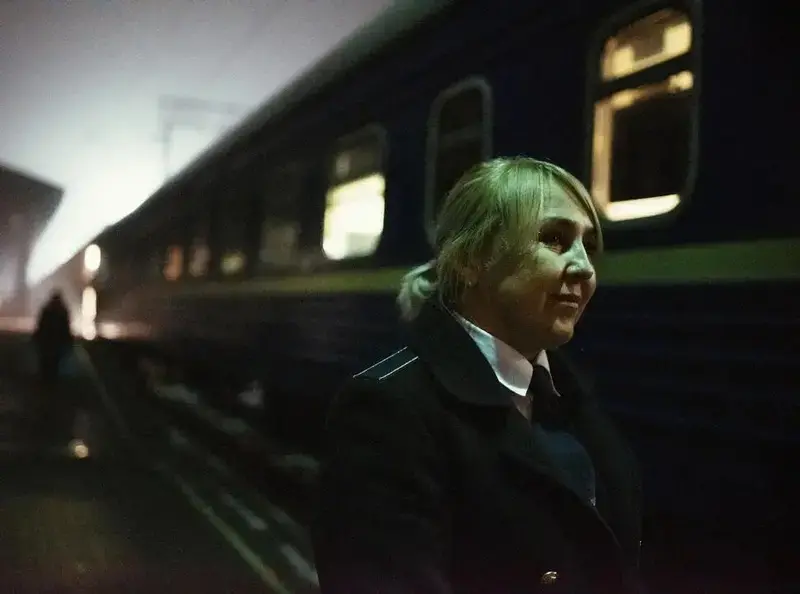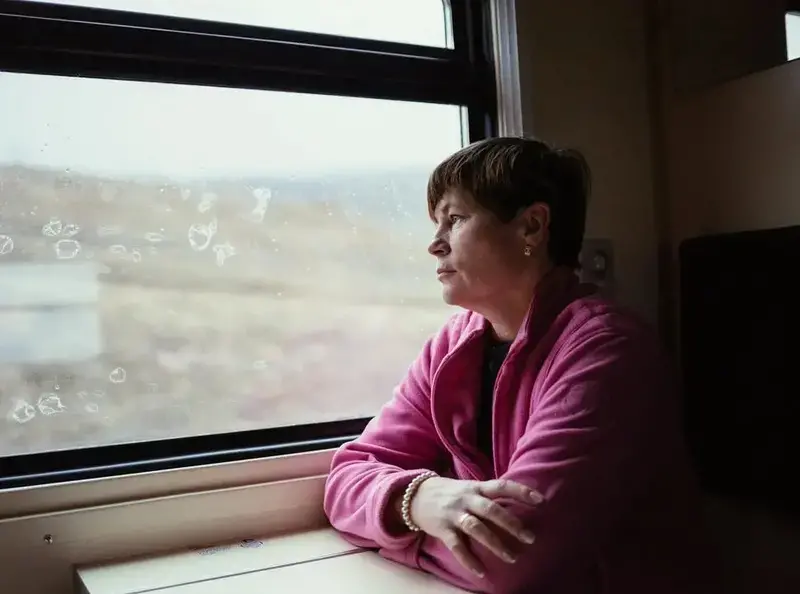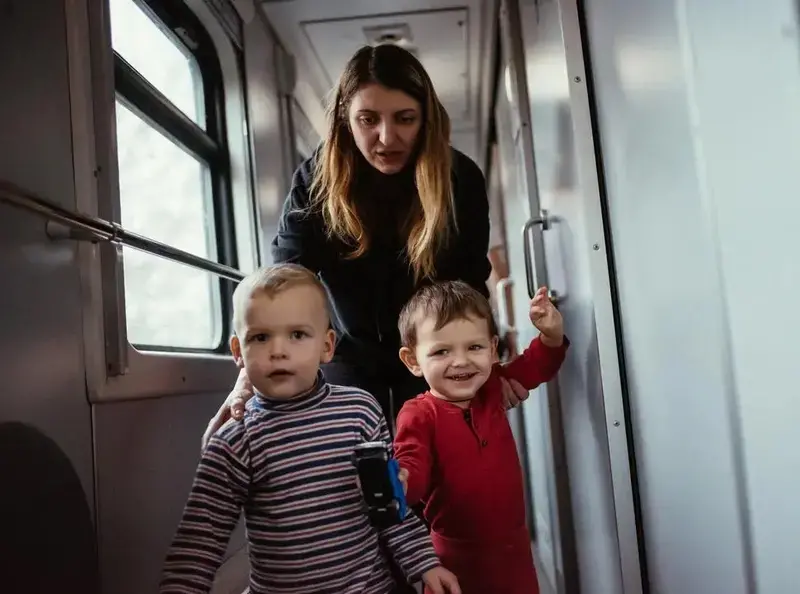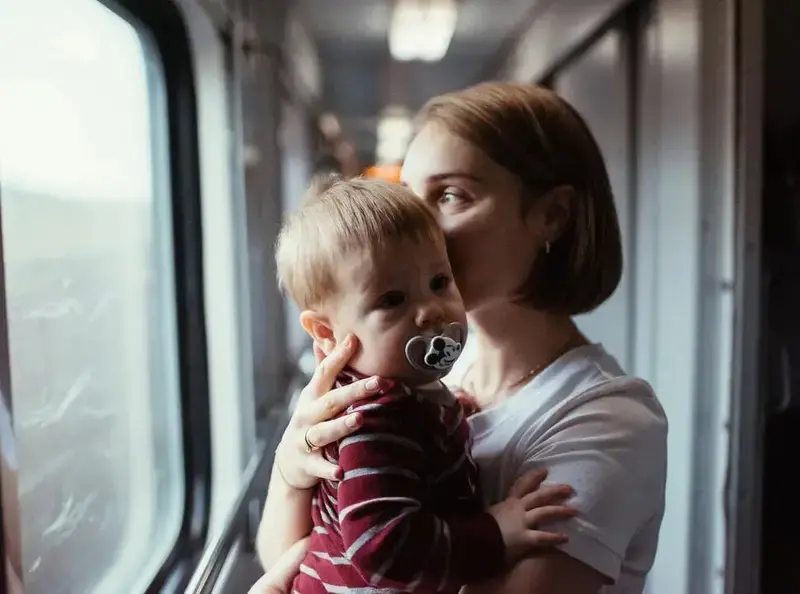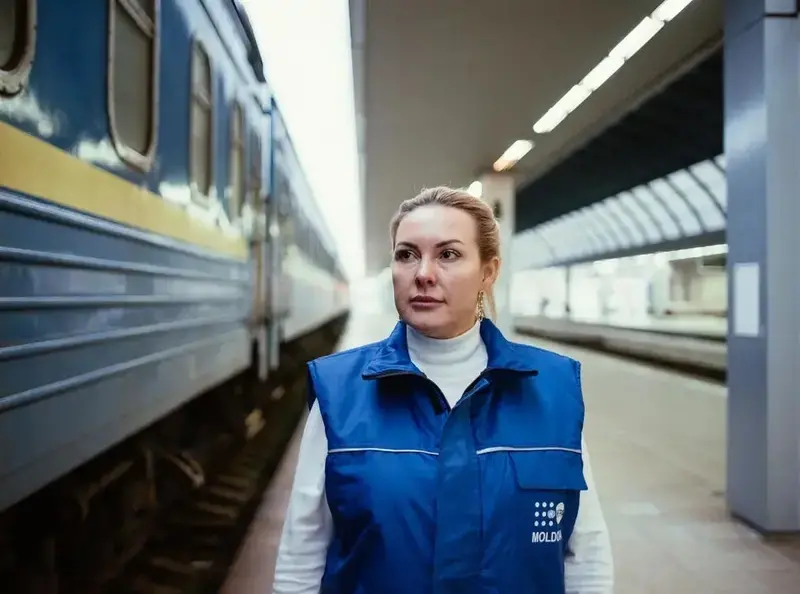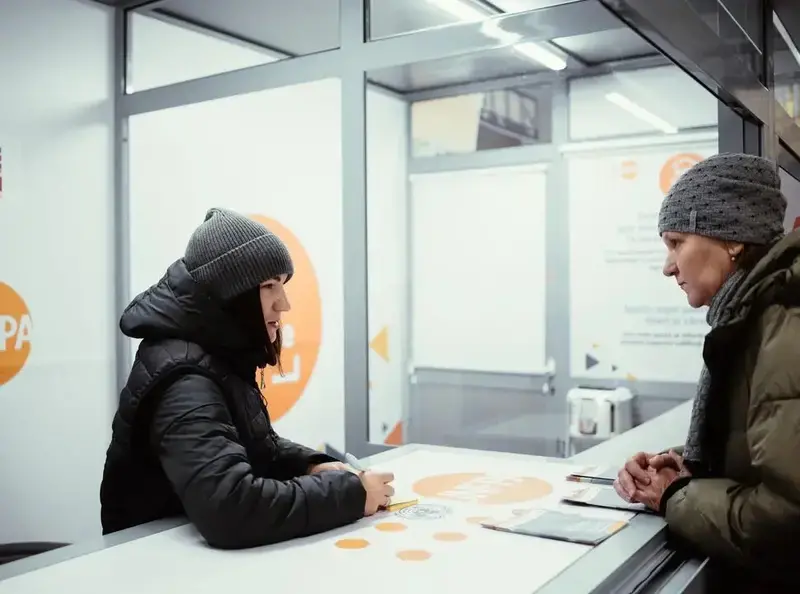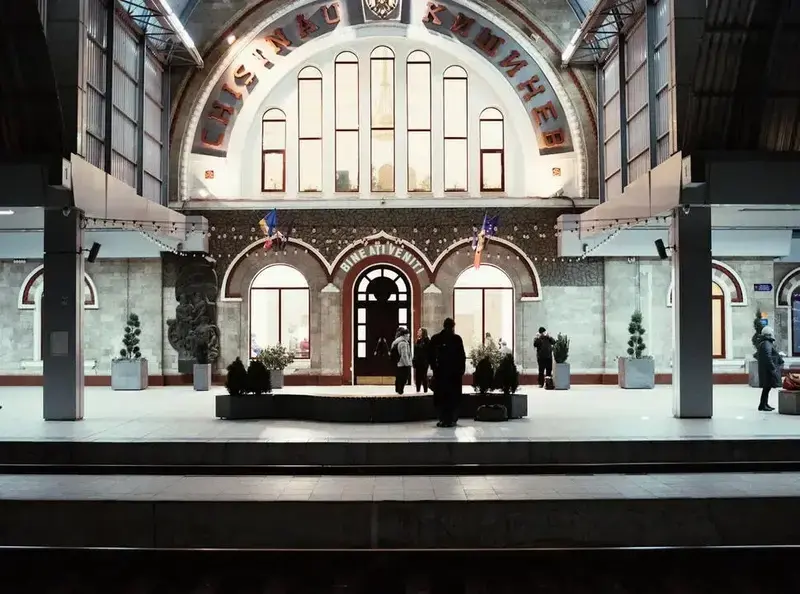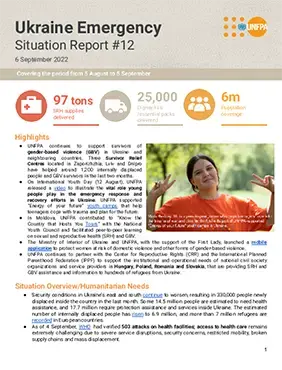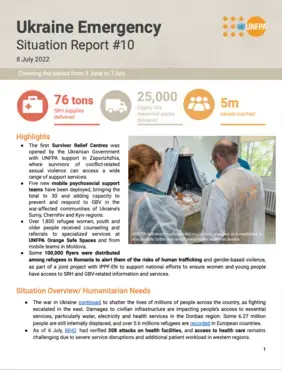Photos
“Places I loved have simply disappeared”: A UNFPA psychologist turns rescue worker after the destruction of Ukraine's dam
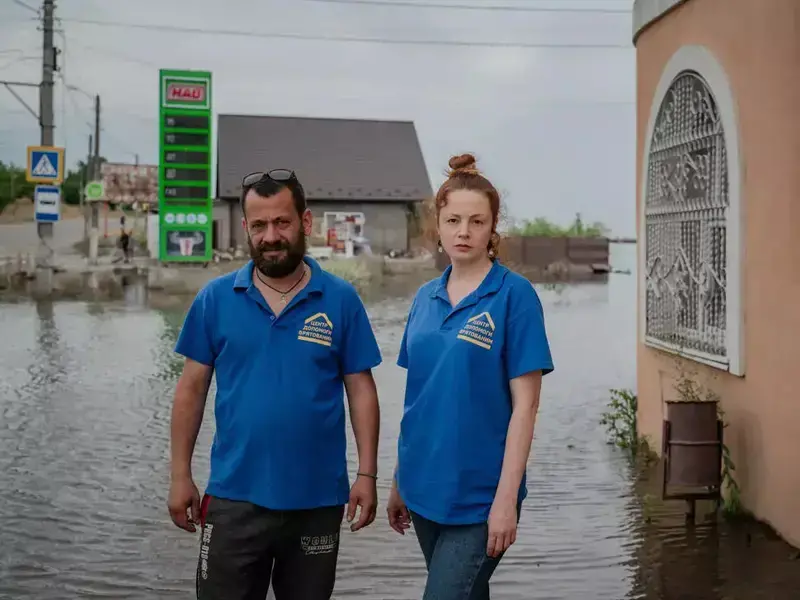
In the early hours of 6 June, the sound of explosions were heard before the Nova Kakhovka dam collapsed. The dam, on the Dnipro River, lies about 30km east of the city of Kherson. As torrents of water were unleashed, thousands of people were displaced in the region, parts of which were submerged underwater.
Iryna Tolstykh, 39, is a psychologist and coordinator of the UNFPA-supported Survivor Relief Centre who woke to news that the vast and vital dam had been destroyed. She has pivoted from counselling to relief efforts in the city that is her home. Here she shares her days in the aftermath of the breach.
“I’ll tell you one thing: I really, really want to live. I love life more than ever.” says Iryna. “I love my arms and legs, because I never thought it would be so easy to lose them. I love my home, because it is where I recover. I value people so much. It is only with a person that you can get warm, that you can share your grief and know that you are not alone in this injustice. A lot of unnecessary things have disappeared, and only the real things remain.”
[Pictured above] Iryna, a psychologist with UNFPA (right) and her colleague Andrii, a driver, have been responding to the devastating crisis in her city of Kherson. © UNFPA Ukraine/Danylo Pavlov.
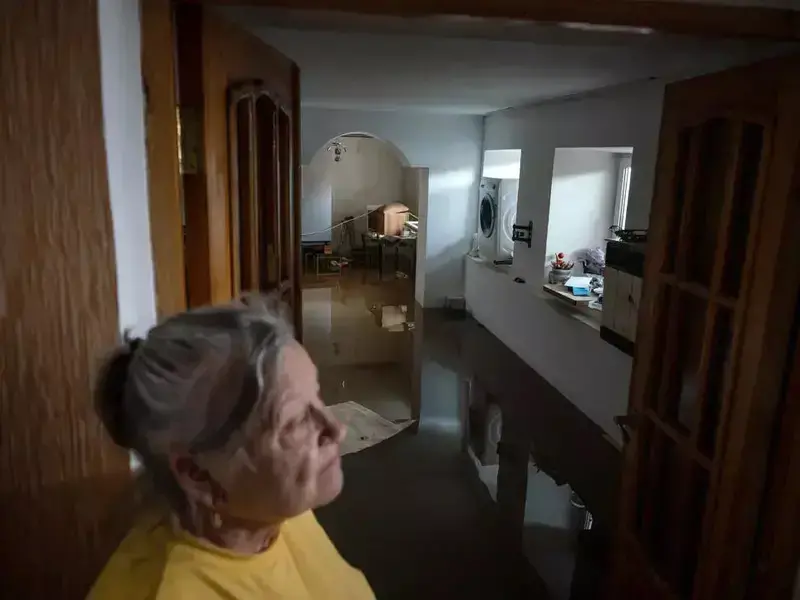
At 7 a.m. on 6 June, Iryna answered a phone call from a friend. “She was in a very anxious state. Her family needed help relocating. When she told me the dam had been blown up, I couldn’t believe it,” Iryna recalls. “I understood that it was a fact, but my mind could not comprehend it. Everyone has known since childhood how scary [the prospect] was - in school we learned how much Kherson would flood if the dam was destroyed.”
Iryna immediately set to work with her colleagues to rescue and re-house residents to higher ground, including their own families and friends. “We had to react quickly,” she says.
[Pictured above] Once the dam was destroyed, many people who had stayed in their homes since the occupation began in 2022 had no choice but to evacuate. © UNFPA Ukraine/Danylo Pavlov.
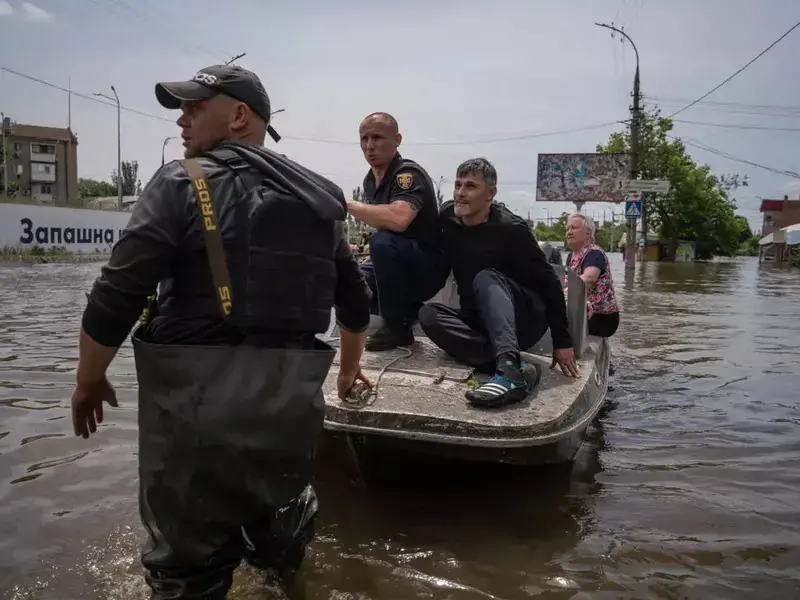
The dam held back a reservoir so large that locals call it the Kakhovka Sea. Its destruction is the largest environmental disaster in Ukraine since the Chernobyl nuclear accident in 1986.
“The word ‘horror’ is not enough,” says Iryna. “This is a global grief, a global catastrophe.”
The disaster has killed or injured unconfirmed numbers as humanitarian needs soar, including the need for clean drinking water, food and access to health services. Military hostilities are adding to the challenges with reports of several attacks affecting civilians and hindering rescue operations.
[Pictured above] The dam’s reservoir spanned an area of more than 2,000 square kilometres. © UNFPA Ukraine/Danylo Pavlov.
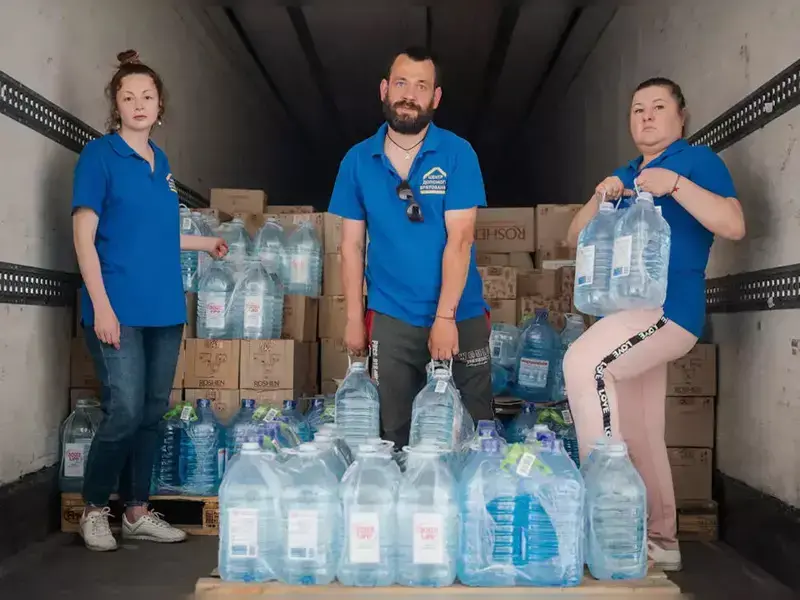
The Survivor Relief Centre (SRC) was founded by the Ukrainian government in December 2022, with support from UNFPA, to provide services to people affected by sexual violence during the war.
SRC operates across 11 cities through dedicated sites or mobile teams. The Kherson team of three–Iryna, Andrii, and their colleague, Anna, a social worker–has always been mobile to operate around shelling.
When the dam was destroyed they refocused their efforts on the overwhelming rescue and humanitarian needs in the city.
[Pictured above] From left: Iryna, Andrii and their colleague Anna, a social worker, support fellow residents around the clock. © UNFPA Ukraine/Danylo Pavlov.
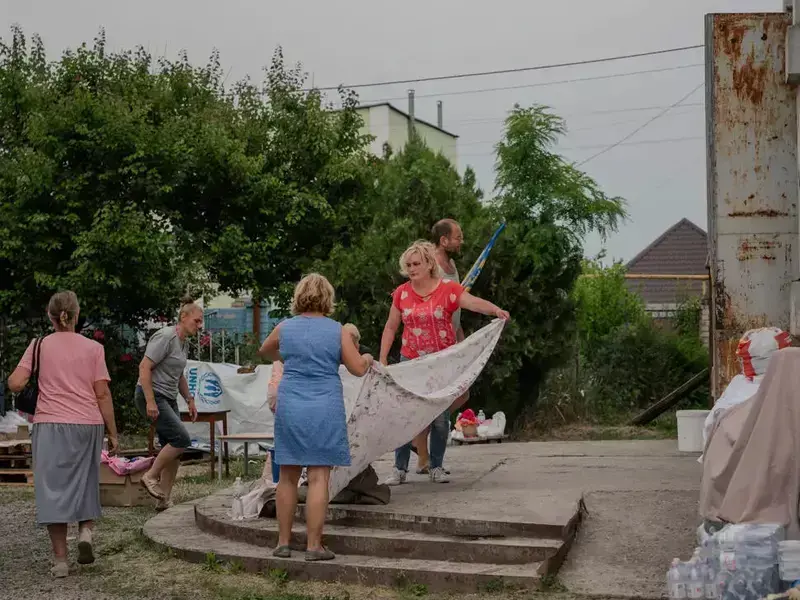
“Before the Kakhovka Dam was blown up, the SRC was organizing meetings with advocacy partners and arranging events with village heads,” says Iryna. “We dealt with the fact that many people considered sexual violence to only mean rape. Harassment, obscene statements, unwanted touching and coercion to have sex were not considered sexual violence.” The SRC raises awareness and provides counselling to those affected.
[Pictured above] Volunteers and survivors rally together to support each other. © UNFPA Ukraine/Danylo Pavlov.
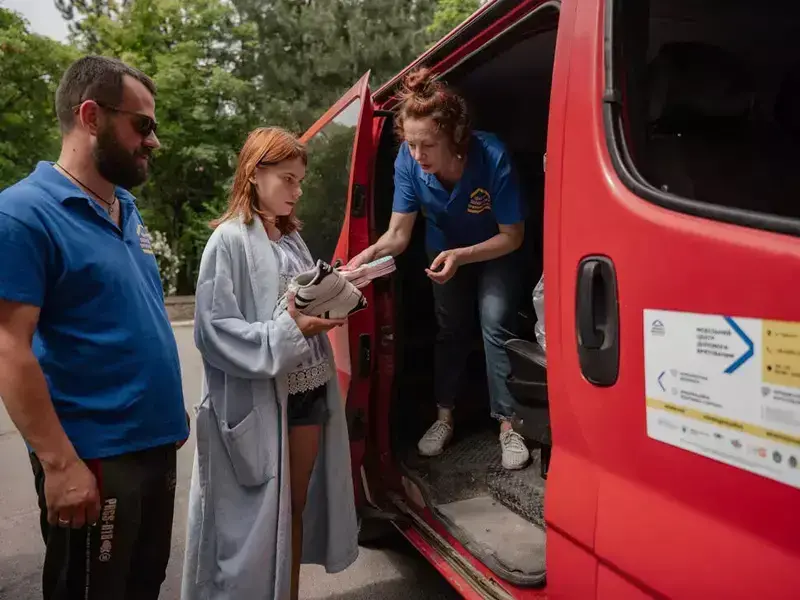
On the first day of the devastating news, as water began to pour from the dam walls, Iryna recalls how they could still evacuate people by van. “We were relocating people with disabilities, the elderly, people with children and animals. The city authorities opened shelters [in parts of the city on higher ground] and settled people there.”
[Pictured above] Iryna helps distribute donated supplies including shoes and clothing to residents who were evacuated with just the clothes on their backs. © UNFPA Ukraine/Danylo Pavlov.
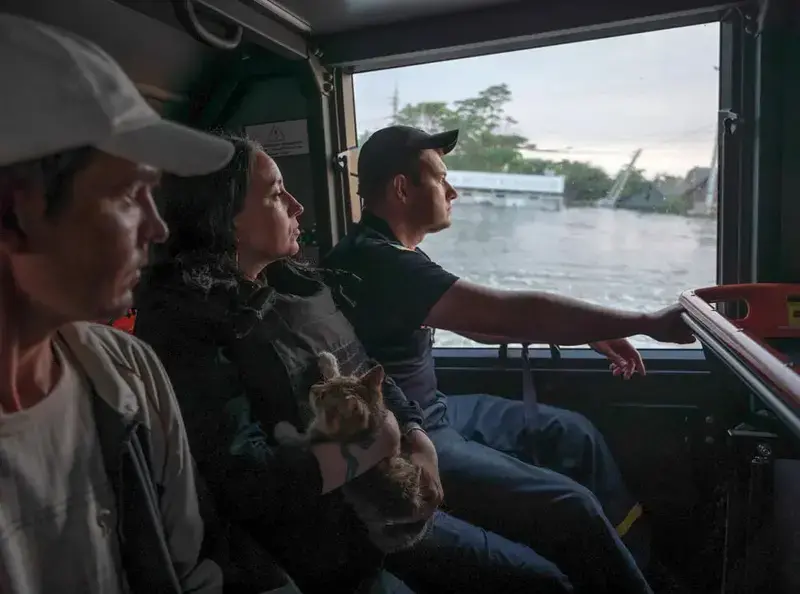
By the second day, water levels had risen drastically. The only way to get around was by boat.
“Lots of people have summer cottages on the river called ‘dacha’, so there were always lots of boats in the city - every second person had one. When Russian troops left the city, they shot the boats to sink them so that residents or the Armed Forces could not use them. Now when we need the boats the most, there are not many of them.”
[Pictured above] Rescuers and evacuees travel by boat around flooded roads. “Places I loved have simply disappeared,” says Iryna. © UNFPA Ukraine/Danylo Pavlov.
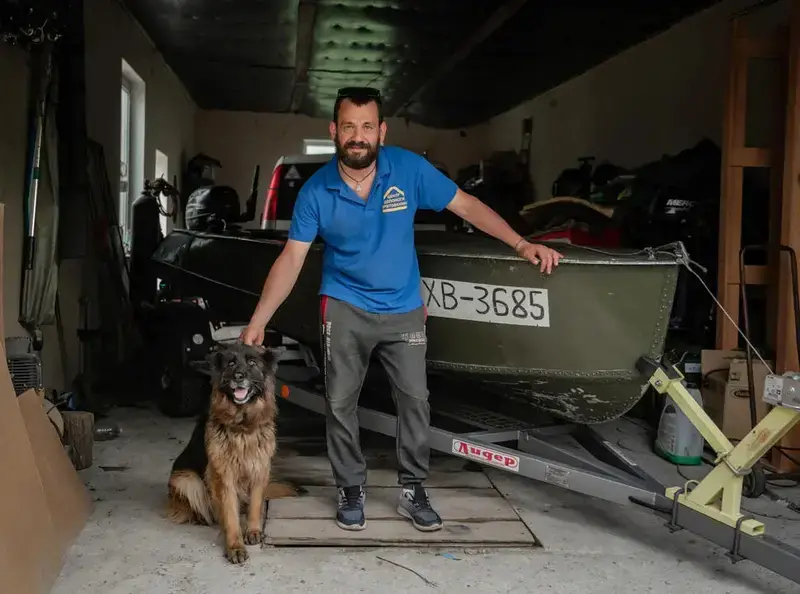
Iryna has high praise for her teammates, Anna and Andrii.
“Andrii drives round in his boat, helping people from roofs, untethering animals, and rescuing anyone he can find.”
“Anna helps our military administration at the warehouse receive humanitarian aid that is brought from all over Ukraine and distributes it to shelters. She also works to resettle people to other locations.”
[Pictured above] The team has met people reluctant to leave their flooded homes if it means t abandoning their beloved animals. Andrii has saved all kinds of animals, including dogs, cats and goats. “Many dogs were sitting on roofs, and I saw many dogs swimming,” he says. © UNFPA Ukraine/Danylo Pavlov.
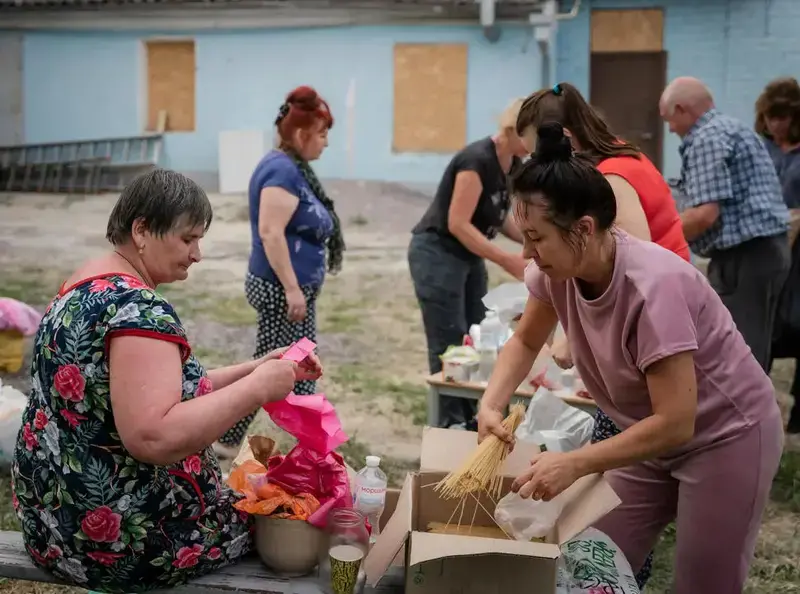
“I provide psychological assistance to evacuees in shelters, working with children who are disoriented, and calming down elderly people who are terrified,” says Iryna.
She also coordinates volunteers, funds, and donations of lifesaving resources from individuals, other SRC sites and NGOs, as well as deliveries of water purification tablets for “people left without drinking water in the Kherson summer heat”; UNFPA dignity kits, and a generator that came from Odesa, about 200km away.
[Pictured above] Volunteers organize the donated supplies, preparing them for distribution. “A grandmother asked for our help, not for herself but food for her cat,” Iryna says. © UNFPA Ukraine/Danylo Pavlov.
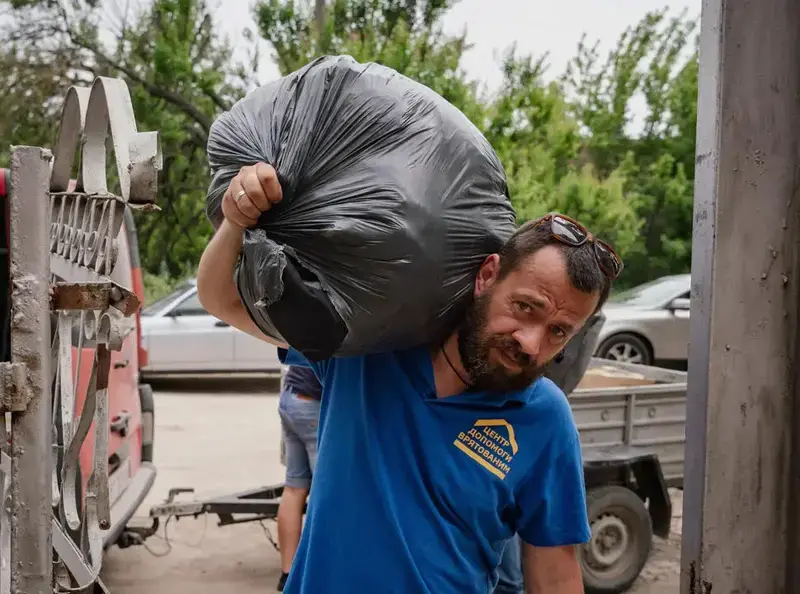
Iryna and colleagues begin each day at 6 a.m. and go to bed around 1 or 2 a.m.
“Our sleep is of poor quality. Everyone working on this effort is in such a state of concentration that we hardly feel our own bodies.”
[Pictured above] The team has been working long hours every day. © UNFPA Ukraine/Danylo Pavlov.
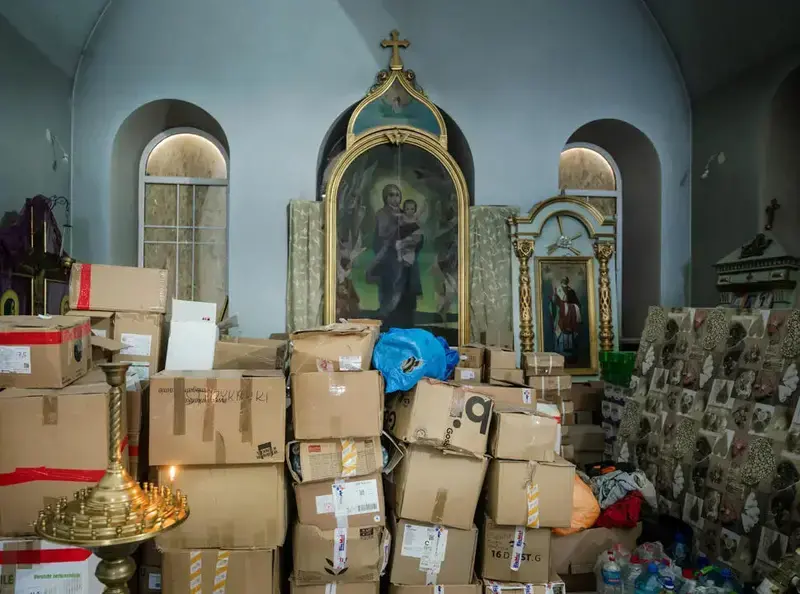
“Our work is hampered by shelling,” Iryna says. “For example, yesterday (13 June), there was very heavy shelling, and I had to stay in the basement. After that, I needed a lot of time to recover.”
[Pictured above] A church is used to store drinking water, food and other essential supplies. © UNFPA Ukraine/Danylo Pavlov.
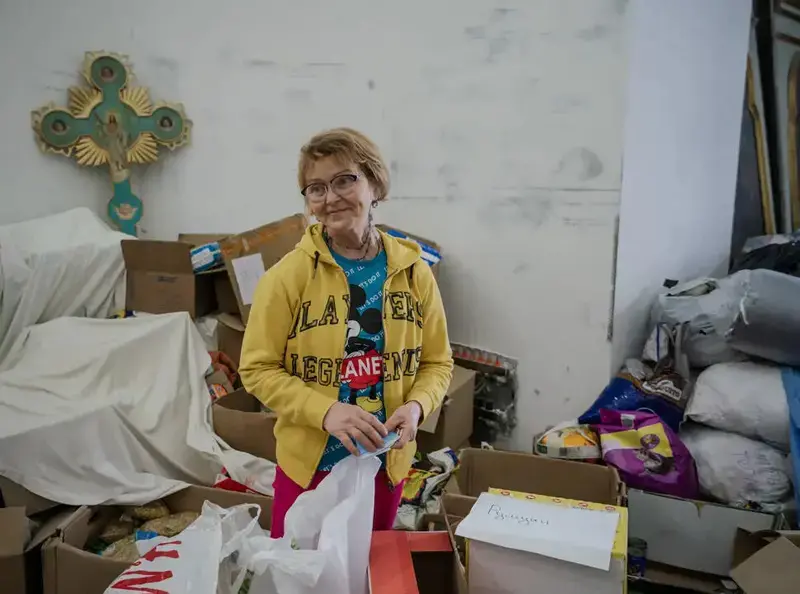
“What survivors need most of all is to be transported to a warm dry place, to a warm dry bed, and given hot tea. They need to be cared for,” Iryna explains. “When they receive sympathy, care and hot lunches, they begin to ‘thaw’.”
[Pictured above] Iryna coordinates volunteers, like the one pictured, who have come together to help other survivors. © UNFPA Ukraine/Danylo Pavlov.
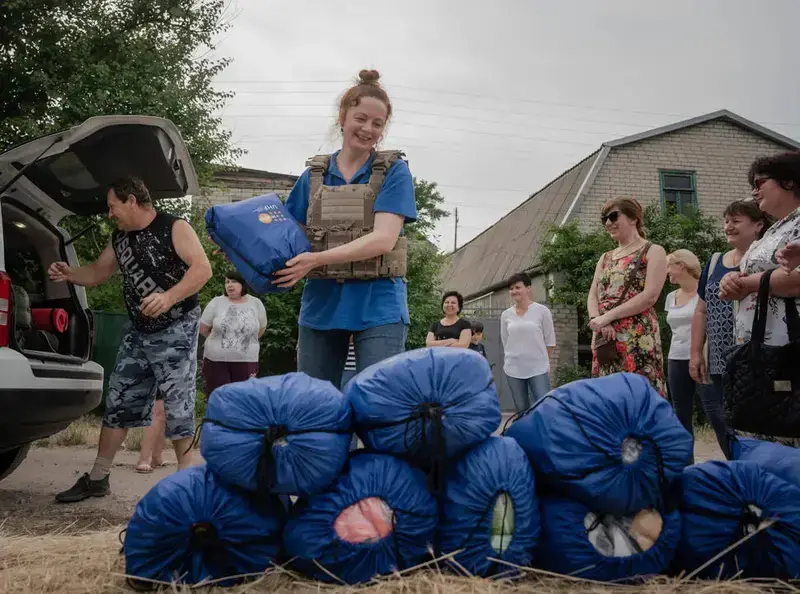
“When people receive blankets, dry clothes and hygiene products, they feel they are not alone with their grief, that they are supported by thousands of people. It is very difficult and painful for them, but seeing help provides people with a sense of strength,” says Iryna.
“We distribute dignity kits to women and teenage girls, and babushka kits to older women. We take most of the kits to the areas that have suffered the most, where people have nothing left.”
[Pictured above] Iryna unloads kits containing essential supplies to meet people’s immediate needs. © UNFPA Ukraine/Danylo Pavlov.
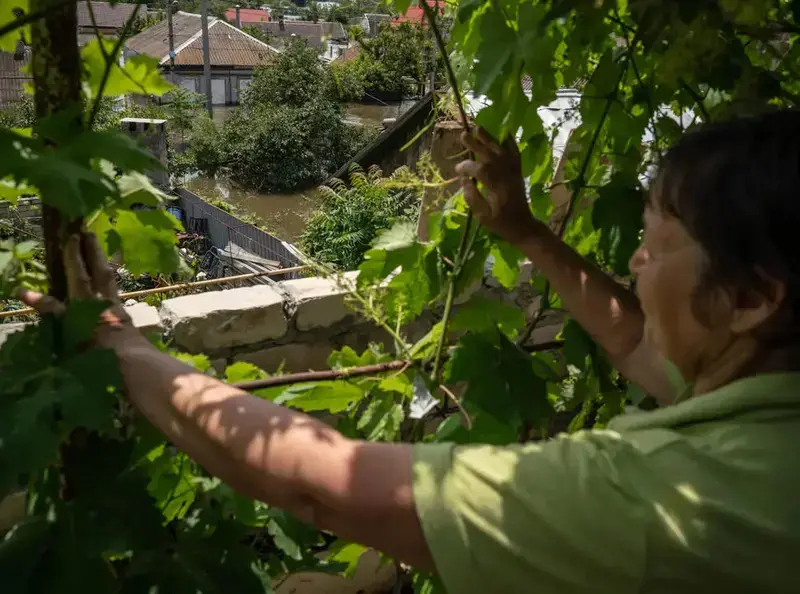
Iryna is concerned about what receding water levels will reveal.
“When the water goes down, there may be corpses of animals and people. Cemeteries were washed away, and in this heat it will be an even more terrible process to deal with. We currently do not have the specialists who can cope with this challenge,” says Iryna.
“My biggest fear is the potential of various epidemics.”
[Pictured above] Water levels are now receding. © UNFPA Ukraine/Danylo Pavlov.
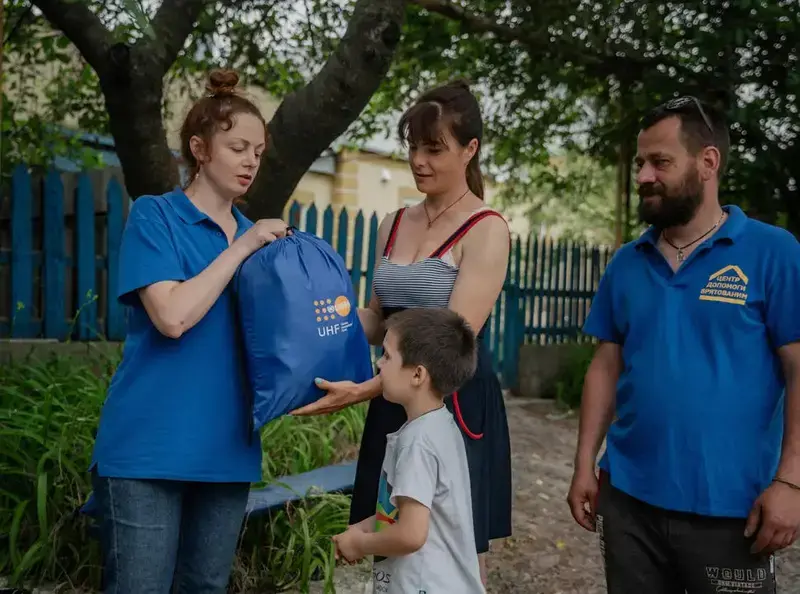
“This tragedy scares me because, despite the fact that we live in a progressive time, where we talk about tolerance, respect and values, there are still people who are ready to wipe entire cities off the face of the earth.”
“I feel powerless because I cannot change it.”
[Pictured above] In January 2022, Kherson’s population was almost 280,000. It is reported that only 20% of its inhabitants remain in the city. © UNFPA Ukraine/Danylo Pavlov.
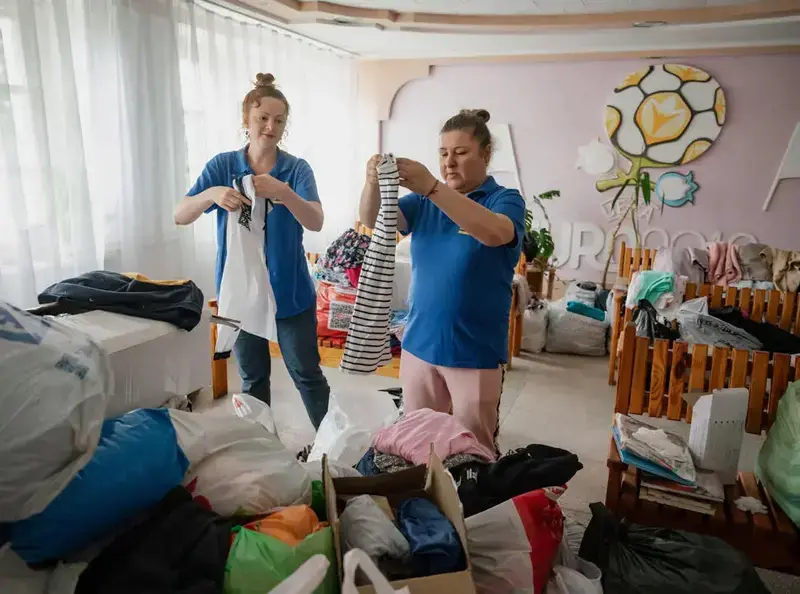
“On the other hand, I am very grateful that I have this job and this team, and that Anna, Andrii and I can help. As a resident of Kherson, as a person for whom everything dear is being destroyed - doing our job helps us avoid despair.”
[Pictured above] Iryna and Anna sort through donations. © UNFPA Ukraine/Danylo Pavlov.
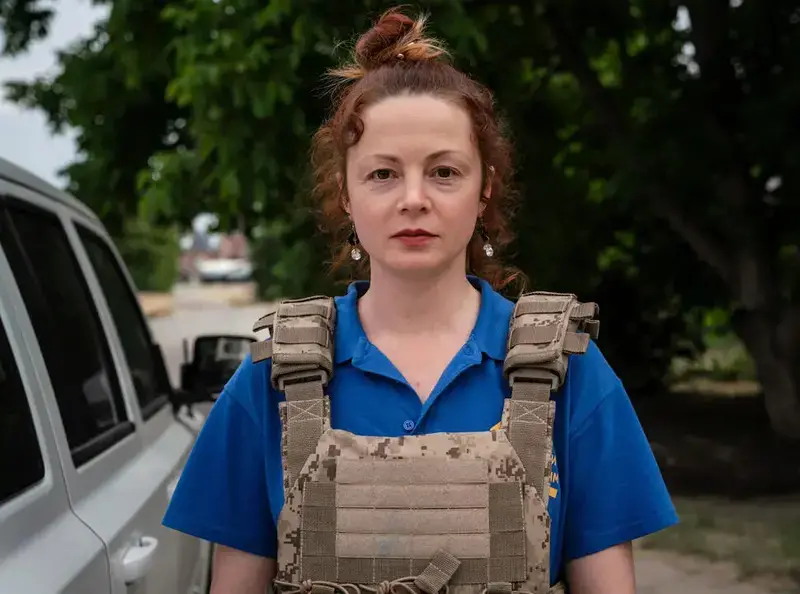
Despite only sleeping 4-5 hours each night, Iryna wishes she had more time.
“We are trying to reach a large number of people, and unfortunately, we are not made of iron, we are not robots. If we were more resilient, stronger, and had more hours in the day, we could help more. But we are ordinary people.”
[Pictured above] Iryna, a psychologist-turned-rescue worker, works under the risk of attack to support her community. © UNFPA Ukraine/Danylo Pavlov.


